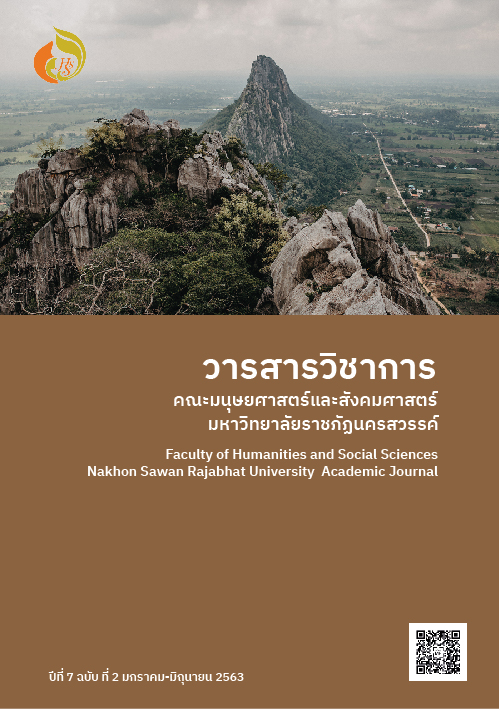การสร้างแรงจูงใจในการเรียนรายวิชาการแปลภาษาจีนเป็นภาษาไทยของผู้เรียนระดับอุดมศึกษา
Main Article Content
บทคัดย่อ
แรงจูงใจคือพลังที่จะช่วยผลักดันผู้เรียนให้แสดงพฤติกรรมและกระทำการต่าง ๆ ที่จะ ทำให้บรรลุเป้าหมายตามที่ตนเองตั้งไว้ ดังนั้นแรงจูงใจจึงมีความสำคัญมากต่อการเรียนทุกรายวิชา โดยเฉพาะวิชาการแปลภาษาจีนเป็นภาษาไทย ซึ่งเป็นวิชาเฉพาะด้าน ผู้เรียนส่วนใหญ่มักจะประสบปัญหาและอุปสรรคในการเรียน จนทำให้ผู้เรียนเกิดความท้อแท้และล้มเลิกได้โดยง่าย ผู้เขียนบทความนี้เป็นอาจารย์ผู้รับผิดชอบสอนในรายวิชาการแปลภาษาจีนเป็นภาษาไทย พบว่าผู้เรียน ส่วนใหญ่คิดว่าเป็นวิชาที่ยาก ผู้เรียนจึงเกิดเจตคติไม่ดีต่อการเรียน ตำราและเอกสารประกอบ การสอนไม่สอดคล้องกับระดับความรู้ของผู้เรียน อีกทั้งรูปแบบและวิธีการสอนของอาจารย์ผู้สอนขาดความหลากหลาย บรรยากาศในชั้นเรียนไม่น่าสนใจ ทำให้ผู้เรียนขาดแรงจูงใจในการเรียน ดังนั้นผู้เขียนจึงศึกษาเกี่ยวกับการสร้างแรงจูงใจในการเรียน ผู้สอนควรสร้างทัศนคติที่ดีให้แก่ผู้เรียน โดยการจัดการเรียนการสอนอย่างหลากหลายและน่าสนใจ ควรจัดทำเอกสารประกอบการสอนให้เหมาะสมกับระดับความรู้ของผู้เรียน อีกทั้งผู้สอนควรพัฒนาทักษะและองค์ความรู้ของตนเองให้มีความเชี่ยวชาญมากขึ้น วิธีการดังกล่าวมีส่วนช่วยสร้างแรงจูงใจให้แก่ผู้เรียน ทำให้ผู้เรียนมีความสุขในการเรียน รวมทั้งส่งผลให้การจัดการเรียนการสอนในวิชาการแปลภาษาจีนเป็นภาษาไทยมีประสิทธิภาพมากขึ้นและบรรลุผลตามจุดประสงค์ของรายวิชา
Article Details
เอกสารอ้างอิง
กฤติยา อริยา, วารีรัตน์ แก้วอุไร และเพ็ญพิศุทธ์ ในสนิท. (2559). การพัฒนารูปแบบการเรียนการสอนตามแนวคิดการจัดการเรียนการสอนที่เน้นความแตกต่างระหว่างบุคคลเพื่อส่งเสริมความสามารถในการออกแบบการจัดการเรียนรู้ในศตวรรษที่ 21 สําหรับนักศึกษาครูมหาวิทยาลัยราชภัฏ. วารสารมหาวิทยาลัยราชภัฏลำปาง, 5(2).
แครอล เอส ดเว็ค (Carol S. Dweck). (2550). เปลี่ยน Mindset...ชีวิตเปลี่ยน. (วิโรจน์ ประสิทธิ์วรนันท์, ผู้แปล). กรุงเทพฯ: อี.ไอ.สแควร์.
จักรแก้ว นามเมือง. (2560). บุคลิกภาพของครูและลักษณะการสอนที่ดี. วารสารบัณฑิตแสงโคมคำ, 2(1), 60-61.
ชณัณกร เพ็ชรวัฒนา. (2559). การแปลของไทยในศตวรรษที่ 21. วารสารการแปลและการล่าม, 1(1), 25.
ชาญเดช วีรกุล. (2552). ความสัมพันธ์ระหว่างแรงจูงใจในการปฏิบัติงานกับขวัญในการปฏิบัติงานของบุคลากรสังกัดสำนักงานการตรวจเงินแผ่นดินภูมิภาคที่ 5 (จังหวัดอุบลราชธานี) (วิทยานิพนธ์ มหาบัณฑิต). อุบลราชธานี: มหาวิทยาลัยราชภัฏอุบลราชธานี.
ปริยา รินรัตนากร. (2559). ปัจจัยที่มีผลต่อการเตรียมความพร้อมเพื่อเข้าสู่ประชาคมเศรษฐกิจอาเซียน (AEC) ของนักศึกษามหาวิทยาลัยเอกชน ในเขตกรุงเทพมหานครและปริมณฑล. วารสารวิชาการมนุษยศาสตร์และสังคมศาสตร์, 24(46).
นริศ วศินานนท์. (2559). การศึกษาสภาพการจัดการเรียนการสอนภาษาจีนระดับอุดมศึกษาในประเทศไทย. วารสารจีนศึกษา, 9(2), 263-264, 272-274.
สํานักงานเลขาธิการสภาการศึกษา. (2559). รายงานการวิจัยเพื่อพัฒนาระบบการจัดการเรียนการสอนภาษาจีนในประเทศไทยระดับ มัธยมศึกษา (รายงานการวิจัย). กรุงเทพฯ: บริษัทพริกหวานกราฟฟิค จํากัด.
สุชาดา สุขบำรุงศิลป์. (2553). แรงจูงใจในการปฏิบัติงานของครูโรงเรียนวิศวกรรมแหลมฉบังจังหวัดชลบุรี (วิทยานิพนธ์มหาบัณฑิต). ชลบุรี: มหาวิทยาลัยบูรพา.
สุริยะ ประทุมรัตน์. (2557). การพัฒนาความมั่นใจในการพูดภาษาอังกฤษของนักศึกษาสาขาวิชาสังคมศึกษาระดับปริญญาตรีโดยใช้รางวัลในการเสริมแรงทางบวก. วารสารมหาวิทยาลัยราชภัฏสกลนคร, 6(12), 73.
Peng Liting. (2557). ปัจจัยที่ส่งผลต่อแรงจูงใจในการเรียนวิชาภาษาจีนของนักศึกษามหาวิทยาลัยสยาม. วารสารกระแสวัฒนธรรม, 15(28), 27-38.
Maslow. A. A (1943). Theory of human motivation. Psychological Review, N.Y. McGraw-Hill


